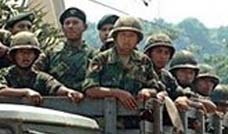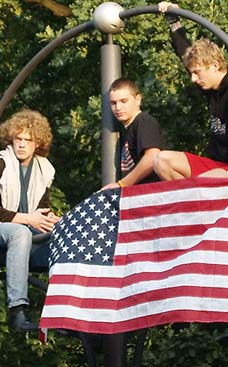
Now a grizzled pensioner in his 60s, divorced and remarried, and splitting his time between Cape Cod and Hawaii, Theroux has retraced his own footsteps. In Ghost Train to the Eastern Star, he takes roughly the same route as he did in 1973, revisiting the countries he traveled through on the Bazaar journey more than 30 years ago. He also revisits his younger self, traveling like "a ghost" through his own memories. Age, he asserts, gives you "the gift to evaluate decay." The truth -- and this is something that Theroux says quite openly -- is that he doesn't like travel books any longer: "Little better than a license to bore," he asserts in his new book, "travel writing is the lowest form of literary self-indulgence: dishonest complaining, creative mendacity, pointless heroics, and chronic posturing." So why then does Theroux go on churning out these carelessly written and increasingly dyspeptic travelogues? The answer is presumably that they provide him with sales, visibility and an income that his parallel career as a writer of fiction has never equaled. It is his curse as a writer that despite producing nearly 30 works of fiction, he is still best known as a travel writer, a profession he has come to despise. Author Paul Theroux served as a Peace Corps Volunteer in Malawi in the 1960's.
William Dalrymple reviews Ghost Train to the Eastern Star by Paul Theroux
A Journey Through Time
Paul Theroux travels the same path through Europe and Asia that he took 30 years ago in "The Great Railway Bazaar."
PHOTOS
Previous Next
Reviewed by William Dalrymple
Sunday, September 28, 2008; Page BW08
GHOST TRAIN TO THE EASTERN STAR
On the Tracks of the Great Railway Bazaar
By Paul Theroux
Houghton Mifflin. 496 pp. $28
In 1973, Paul Theroux was down on his luck. As he says in his revealingly autobiographical new travel book, Ghost Train to the Eastern Star, his early life had been full of humiliation and failure, and he writes with feeling of "my nagged and scolded childhood, my undistinguished school career as a punk, no good at games, bewildered in college, terminated early from the Peace Corps, disgraced from Singapore [University] when my contract wasn't renewed, hard up in London, refused a credit card by American Express at the age of thirty-two because I had no visible credit." Nor was his early literary career a blazing success. Critics gave only a modest reception to his early novels Waldo, Fong and the Indians and Jungle Lovers, and none of them sold more than a few hundred copies.
Then, in 1973, Theroux somehow convinced his publisher to give him an advance for a book about train travel. That year, he set off from Victoria Station in London for a months-long journey to Tokyo Central. The resulting book, The Great Railway Bazaar, came out two years later and sold more than 1.5 million copies; it has since been translated into some 20 languages.
The book provided Theroux with an income and a career. It also breathed new life into the sort of travel memoir that had flourished in an earlier and less politically correct age, but which had languished since the European empires imploded after World War II. Theroux liked to depict himself as the contemptuous and coolly detached curmudgeon abroad, filling the long hours in the railway carriage by scribbling uncharitable comments about his fellow passengers into his notebook: ticking one off for his incomprehensible accent, another for being ugly, a third for his terrible dress sense. The Great Railway Bazaar was, however, hugely engaging. Part of the fun of it was that the author painted such a rivetingly unflattering portrait of himself -- was this deliberate? It was hard to tell.
ad_icon
In the years that followed, Theroux applied the same techniques to South America, Britain and China, before heading off to sea in The Happy Isles of Oceania. Here, he paddled around the Pacific, writing off whole nations in single, stinging sentences: The Japanese are "little bowlegged people who can't see without glasses," he tells us in Happy Isles, while Melanesians are "small scowling knob-headed blacks with short legs and big dusty feet." Tongans meanwhile are "unapologetic, envious, abrupt, lazy, mocking, quarrelsome, and peculiarly sadistic to their children." This sort of thing is not to everyone's taste (the London Sunday Times advised its readers that The Kingdom by the Sea was "best avoided by patriots with high blood pressure"), but the books sold and Theroux's star rose.
Now a grizzled pensioner in his 60s, divorced and remarried, and splitting his time between Cape Cod and Hawaii, Theroux has retraced his own footsteps. In Ghost Train to the Eastern Star, he takes roughly the same route as he did in 1973, revisiting the countries he traveled through on the Bazaar journey more than 30 years ago. He also revisits his younger self, traveling like "a ghost" through his own memories. Age, he asserts, gives you "the gift to evaluate decay."
Occasionally, his route is blocked by political upheaval: Refused a visa for Iran, he loops across the Caucasus, crosses the dangerous borderlands between Turkmenistan and Uzbekistan, before flying over Afghanistan into India. The book is also full of personal revelations hidden in the earlier book. We are told how, for example, that when Theroux set off on that first journey, he effectively lost his wife and family. None of them wanted him to go, and by the time he returned, his wife had taken a lover. The marriage never recovered.
At his best, Theroux is still an addictively engaging writer, endlessly curious and perceptive, hardy, chatty and sometimes very funny. There are one or two fabulous set pieces, such as a beautifully sketched scene in a soup kitchen in Tblisi:
"This scene was almost Chaucerian, something almost medieval and bawdy about each heavily dressed, red-faced person gobbling at a big tin bowl of soup and a big bowl of bread -- a whole round loaf cut into chunks -- and a saucer of noodle salad sprinkled with oregano. The clank of spoons, the slurping of soup, the laughter, the yelling, children squawking, bowls being brought in on trays and banged down on the trestle tables: it was a rollicking scene of appetite and good cheer."
The trouble is that these high points are few and far between, and through much of the book there is a strong feeling that Theroux's heart is not really in it. He is not interested in the architecture (he blandly describes both church towers and minarets as "spires") or the history of the places through which he passes. Indeed, his only real pleasure seems to come from keeping company with fellow writers: The book comes to life when he meets Orhan Pamuk and the beautiful Elif Shafak in Istanbul, has dinner with Pico Iyer in Kyoto and visits a sex shop with Haruki Murakami in Tokyo.
Elsewhere, however, we have the usual one-line dismissals of entire nations -- Georgia, for example, is "a supine and beleaguered country of people narcissistic about their differences" -- and the endless train journeys and disappointing meals seem increasingly pointless. Also, the prose of Ghost Train is uneven and repetitious: We are told over and over again about his idea of the East-to-West migration of the poor and the ambitious. And there are factual errors: The city of Byzantium, founded in 657 B.C., was already 900 years old in 300 A.D. when Theroux believes it was established. His descriptions of cities and landscapes are rarely better than workmanlike, and the book is full of one-line banalities: "I always felt lucky on a train"; "Most of the world is worsening, shrinking to a ball of bungled desolation"; "No one on earth is well governed."
A particularly lame but revealing moment comes when Theroux visits a sex shop in Budapest: "A country's pornography," he writes, "offers the quickest insight into the culture and inner life of a nation." Compare this with one of the great masters of the genre, Robert Byron. As Bruce Chatwin wrote in his introduction to The Road to Oxiana, Byron was a "connoisseur of civilizations" who had an "uncanny ability to gauge the morale of a civilization from its architecture, and to treat ancient buildings and modern people as two facets of a continuing story." Both techniques have their revelations, but there is little doubt which of the two makes for more profound reading.
The truth -- and this is something that Theroux says quite openly -- is that he doesn't like travel books any longer: "Little better than a license to bore," he asserts in his new book, "travel writing is the lowest form of literary self-indulgence: dishonest complaining, creative mendacity, pointless heroics, and chronic posturing." So why then does Theroux go on churning out these carelessly written and increasingly dyspeptic travelogues? The answer is presumably that they provide him with sales, visibility and an income that his parallel career as a writer of fiction has never equaled. It is his curse as a writer that despite producing nearly 30 works of fiction, he is still best known as a travel writer, a profession he has come to despise.
Yet the travel book remains, at least potentially, a hugely flexible and capacious pot into which a wonderfully varied selection of ingredients can be thrown by an imaginative writer. Theroux was himself one of the main causes of the modern revival of travel writing. The success of the Great Railway Bazaar inspired Bruce Chatwin to give up his job and to go off to South America. The result -- In Patagonia-- was published in 1977, the same year Patrick Leigh Fermor produced A Time of Gifts, and Theroux's former friend V.S. Naipaul published his brilliant India: A Wounded Civilization. The three books remain among the unsurpassed masterpieces of post-war travel writing. All stand as monuments to the possibilities of the genre, and also show up the superficiality and inadequacies of Theroux's more recent work.
The tragedy is that Theroux is not without great talents -- far from it; flashes of wit and even genius pepper the pages of this book. But aware that his travel books sell anyway, he has become lazy, and this slapdash and uneven job is a poor reflection of the 1975 book that first made his name. Ghost Train to the Eastern Star is not without its moments, but by the end the reader is left with the unmistakable impression that this great train traveler has run out of steam. ·
William Dalrymple is the author of "From the Holy Mountain" and "The Last Mughal."












